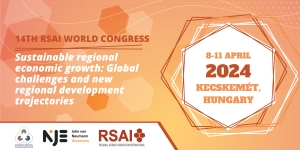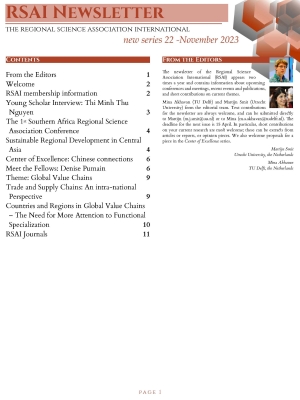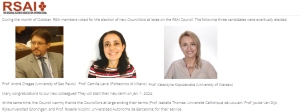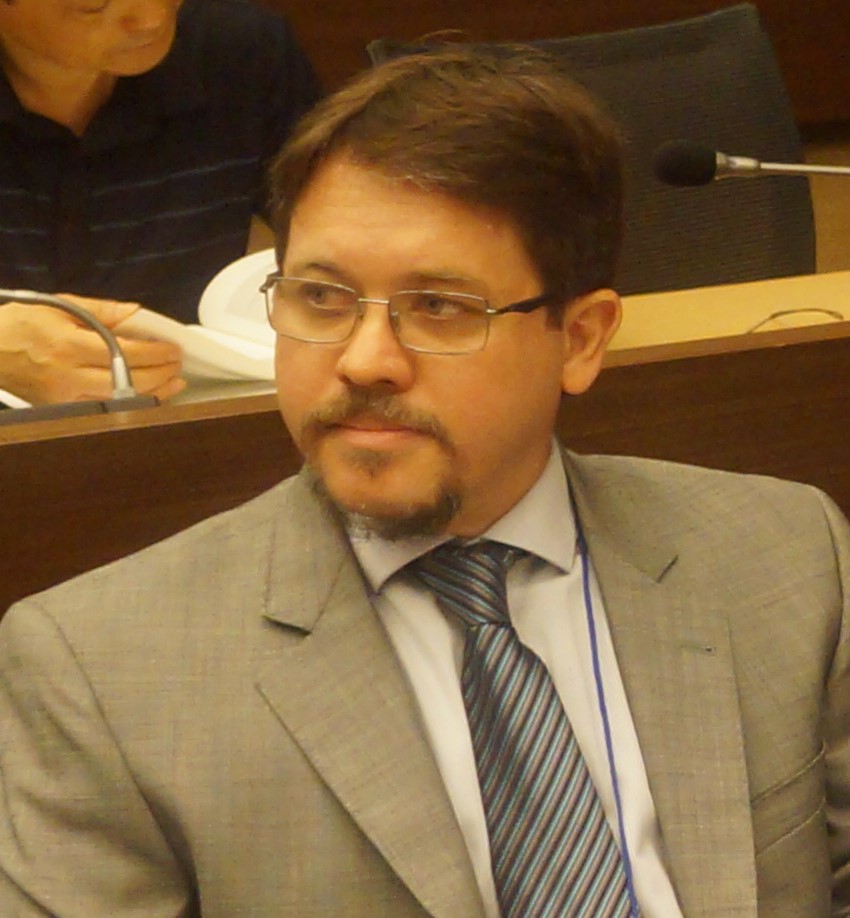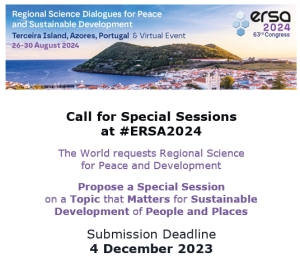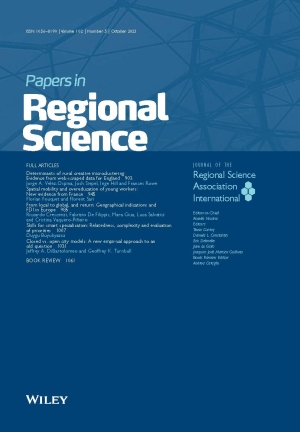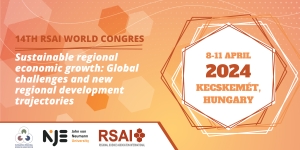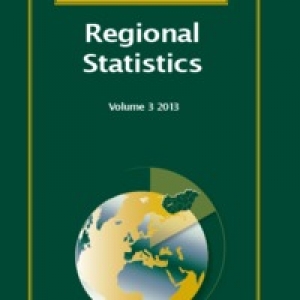Archives
Elisabete Martins
Extension deadline | 2024 RSAI World Congress, 8-11 April, 2024, Kecskemét, Hungary
Dear RSAI members,
We hope this email finds you all well.
We are writing you concerning the deadline for submitting your abstracts to the 14th edition of the World Congress of the RSAI in Kecskemét, Hungary, from Apr. 8 through 11, 2024. The congress' main theme is "Sustainable regional economic growth: global challenges and new regional development trajectories"
Following the requests from many angles of the world, the RSAI decided jointly with the LOC to postpone the deadline for submissions to Dec. 31, 2023.
There is still room for organizing one or more special sessions at the World Congress; if you are interested in organizing one, please do get in touch with the Program Chair, Andrea Caragliu (This email address is being protected from spambots. You need JavaScript enabled to view it.) and the congress secretariat (This email address is being protected from spambots. You need JavaScript enabled to view it.) as soon as possible.
Decisions concerning the acceptance of papers and sessions submitted between now and the final deadline will be announced by mid January 2024. Once accepted, presenters will be able to register on the same platform used for submitting your abstracts. You will find all information related to the congress, and the link to the submission platform, at the congress website:
https://regionalscience.org/2024RSAIcongress/index.html.
Thank you in advance for your attention,
We look forward to seeing you in Kecskemét!
Call for Applications to The Benjamin H. Stevens 2024-2025 Graduate Fellowship in Regional Science
THE BENJAMIN H. STEVENS 2024–2025
GRADUATE FELLOWSHIP IN REGIONAL SCIENCE
Graduate students enrolled in Ph.D. programs in North America are encouraged to apply for the Twenty-Fourth Benjamin H. Stevens Graduate Fellowship in Regional Science, administered by the North American Regional Science Council of the Regional Science Association International (NARSC-RSAI).
This Fellowship, in support of dissertation research in Regional Science, is awarded annually in memory of Dr. Benjamin H. Stevens, an intellectual leader whose selfless devotion to graduate students as teacher, advisor, mentor, and friend had a profound impact on the field. Regional Science is a multidisciplinary field concerned with urban and regional phenomena. Regional Scientists apply theoretical and empirical frameworks and methods of the social and other sciences, as well as develop new ones specifically for regional analysis and policy.
----------------------------------------------------------------------------------------------------------------------------------------------
Please find the details in the attached Call for Applications.
RSAI Newsletter (November 2023)
Dear RSAI members,
I hope this email finds you well.
I am pleased to write you to send you the newest issue of the RSAI Newsletter (download).
Enjoy the read, and please do not hesitate to get in touch with Martijn (This email address is being protected from spambots. You need JavaScript enabled to view it.) and Mina (This email address is being protected from spambots. You need JavaScript enabled to view it.) to propose new material for the newsletter.
Kind regards,
André Chagas was recently elected President of the Latin American and Caribbean Regional Science Association (LARSA).
 André Chagas was recently elected President of the Latin American and Caribbean Regional Science Association (LARSA).
André Chagas was recently elected President of the Latin American and Caribbean Regional Science Association (LARSA).
He is an Associate Professor at the Department of Economics at the University of Sao Paulo (USP) and a valuable member of the University of Sao Paulo Regional and Urban Economics Lab (NEREUS). André has taken over different positions in the Brazilian section of RSAI, ABER, leading the organization in the biennial 2018-2019. According to the statement on his motivations for applying as LARSA president, he plans to resume next year the in-presence LARSA congress, after its interruption due to the pandemic. Among the challenges he will face in the next two years leading the Association, he will focus on the nurturing of recently created sections as well as the creation of new sections in Latin America following up initiatives from RSAI administrations in the region in countries such as Argentina, Costa Rica, Ecuador, Paraguay, and Peru. He will be engaged in further developing RSAI in Latin America and breathing more life into LARSA, with the support of well-established associations in Brazil, Chile, Colombia, and Mexico. Finally, he plans to increase the membership and stimulate the participation of regional scientists from the region in RSAI activities, with special attention to young scholars, drawing on existing successful RSAI programs. We wish André all the best in his journey!
New Councillors at large elected
During the month of October, RSAI members voted for the election of new Councillors at large on the RSAI Council. The following three candidates were eventually elected:
|
Prof. André Chagas (University of Sao Paulo) |
Prof. Camilla Lenzi (Politecnico di Milano) |
Prof. Katarzyna Kopczewska (University of Warsaw) |
Many congratulations to our new colleagues! They will start their new term on Jan. 1, 2024.
At the same time, the Council warmly thanks the Councillors at large ending their terms (Prof. Isabelle Thomas, Université Catholique de Louvain, Prof. Jouke Van Dijk, Rijksuniversiteit Groningen, and Prof. Rosella Nicolini, Universidad Autonoma de Barcelona) for their service.
ERSA Congress 2024 | There is still time to propose a Special Session
|
|
|
|
|
|
|
The latest issue of Papers in Regional Science is available! Volume 102, Issue 5, October 2023
|
|
Papers in Regional Science 901-1063
October 2023
|
ISSUE INFORMATION
FULL ARTICLES
Determinants of rural creative microclustering: Evidence from web-scraped data for England
Jorge A. Velez-Ospina, Josh Siepel, Inge Hill, Frances Rowe
Spatial mobility and overeducation of young workers: New evidence from France
Florian Fouquet, Florent Sari
From local to global, and return: Geographical indications and FDI in Europe
Riccardo Crescenzi, Fabrizio De Filippis, Mara Giua, Luca Salvatici, Cristina Vaquero-Piñeiro
Skills for smart specialisation: Relatedness, complexity and evaluation of priorities
Duygu Buyukyazici
Closed vs. open city models: A new empirical approach to an old question
Jeffrey A. DiBartolomeo, Geoffrey K. Turnbull
BOOK REVIEW
Roberto Dellisanti
Winner of 2023 RSAI Dissertation Award
 Dr Yunyu Tian is chosen as the winner of the RSAI dissertation award in 2023 for her PhD dissertation entitled “Earth Observation data for assessing global urbanization-sustainability nexuses”, which was successfully defended (with a cum laude distinction) on 6 June 2023 at Wageningen University and Research.
Dr Yunyu Tian is chosen as the winner of the RSAI dissertation award in 2023 for her PhD dissertation entitled “Earth Observation data for assessing global urbanization-sustainability nexuses”, which was successfully defended (with a cum laude distinction) on 6 June 2023 at Wageningen University and Research.
The cum laude distinction (only given to around 5% of all PhD students at Wageningen University) was awarded by an extended evaluation committee of nine persons. Dr Tian’s PhD dissertation made significant contributions towards the knowledge of urbanization and environmental changes at the global scale. The thesis included highly innovative methodological features such as the use of multi-source (and high quality) Earth Observation data and social data, contributing to academic and policy knowledge relating to global urbanization and sustainability as well as their nexus at the neighbourhood level. Part of the thesis has already been published in the form of academic peer-reviewed papers in the journals Landscape and Urban Planning (2022) and Environmental Research Letters (2022).
The RSAI congratulates Dr. Tian and her supervisors Professor Martin Herold and Professor Eveline van Leeuwen (Wageningen University).
Reminder | Call for papers 2024 RSAI World Congress, 8-11 April, 2024, Kecskemét, Hungary
Dear RSAI members,
We hope this email finds you all well.
We are writing you to kindly remind you to join the global regional science community for the 14th edition of the World Congress of the RSAI in Kecskemét, Hungary, from Apr. 8 through 11, 2024. The congress' main theme is "Sustainable regional economic growth: global challenges and new regional development trajectories"
The conference is jointly organized by the RSAI and the Hungarian section of ERSA (MRTT), and hosted by John Von Neumann University, courtesy of the LOC, chaired by Prof. József Kárpáti and Prof. Balázs Forman.
If you are interested in organizing one or more special sessions at the World Congress, please do get in touch with the Program Chair, Andrea Caragliu (This email address is being protected from spambots. You need JavaScript enabled to view it.) and the congress secretariat (This email address is being protected from spambots. You need JavaScript enabled to view it.) as soon as possible.
This is a reminder that deadline for submitting both papers and special sessions is Nov. 30, 2023. Decisions concerning the acceptance of papers and sessions will be announced by mid December, 2023. Once accepted, presenters will be able to register on the same platform used for submitting your abstracts. You will find all information related to the congress, and the link to the submission platform, at the congress website:
https://regionalscience.org/2024RSAIcongress/index.html.
We are also excited to deliver great news about publishing opportunities for congress participants. Please do take a look at the dedicated webpage:https://regionalscience.org/2024RSAIcongress/publishing-opportunities.html
Thank you in advance for your attention,
We look forward to seeing you in Kecskemét!
Hans Westlund
Professor of Urban and Regional Studies
KTH Stockholm
RSAI President
Andrea Caragliu
Associate Professor of Regional and Urban Economics
Politecnico di Milano, ABC Department
RSAI Executive Director
The New Issue of Regional Statistics is already Available! (2023, VOL 13, No 5)
THE NEW ISSUE OF REGIONAL STATISTICS IS ALREADY AVAILABLE!
We are pleased to inform you that a new issue of the Regional Statistics has been released and now it’s available online.
https://www.ksh.hu/terstat_eng_current_issue
REGIONAL STATISTICS, 2023, VOL 13, No 5.
STUDIES
Katalin Lipták – Áron Kincses: International migration of Ukrainian citizens to Central Europe before the Russo–Ukrainian wars
https://www.ksh.hu/statszemle_archive/regstat/2023/2023_05/rs130501.pdf
Byambasuren Dorjnyambuu: Entrepreneurial activity at the early stages in Central and Eastern European countries: Individual characteristics and the gender gap
http://www.ksh.hu/statszemle_archive/regstat/2023/2023_05/rs130502.pdf
Bunde Aggrey Otieno: External public debt and economic growth relationship: Evidence from developing Sub-Saharan African countries, 1980–2018
https://www.ksh.hu/statszemle_archive/regstat/2023/2023_05/rs130503.pdf
Lívia Varga: Fitting and forecasting multi-population mortality models based on Hungarian regional data
http://www.ksh.hu/statszemle_archive/regstat/2023/2023_05/rs130504.pdf
Viktória Endrődi-Kovács - Oleg Tankovsky: A composite indicator to evaluate EU membership: The case of Central and Eastern European member states, 2004–2021
http://www.ksh.hu/statszemle_archive/regstat/2023/2023_05/rs130505.pdf
Gábor Vona: Analysis of retail customers in the field of environmentally conscious behavior with respect to home, mobility, heating and cooling, and governance
http://www.ksh.hu/statszemle_archive/regstat/2023/2023_05/rs130506.pdf
Botond Kapás: Can democratic transition lead to more foreign aid inflow? A synthetic control method analysis of Senegal, 1985–2018
http://www.ksh.hu/statszemle_archive/regstat/2023/2023_05/rs130507.pdf
Géza Tóth – Zoltán Nagy: An analysis of federal income inequality in the United States, 1917–2018
http://www.ksh.hu/statszemle_archive/regstat/2023/2023_05/rs130508.pdf
Join us to our social networking sites:
About Us
The Regional Science Association International (RSAI), founded in 1954, is an international community of scholars interested in the regional impacts of national or global processes of economic and social change.

